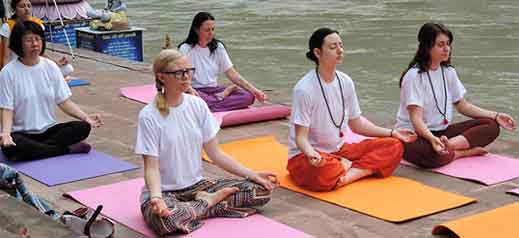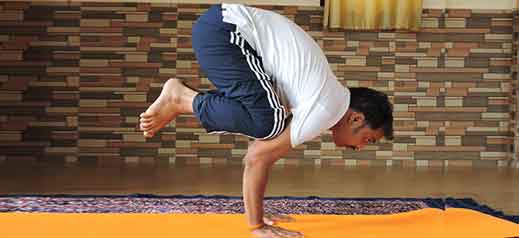500 Hours Hatha Yoga Teacher Training Course Curriculum
500 Hours Hath Yoga Teacher Training Course
The course curriculum of "500 Hours Hath Yoga Teacher Training Course" consists of the structured combined syllabus of RYS 200 hours and RYS 300 Hours Syllabus.
The curriculum of the course and its teaching modules are carefully selected and sequenced to develop the structured progressive approach ensuring the fundamental foundational study of yoga as well as its applications through the advanced study.
The syllabus is containing deeper philosophical and practical aspects of the yoga subject with emphasis on the allied sciences including principles and therapuetical applications of yoga.
Practical Training in Yoga:
Practice of the following yogic practices with brief theoretical knowledge about their importance of the name, the technique, salient points, precautions to be taken and advantages of each of the following yogic practices.
Asanas:
Students will study and practice of beginners and advanced poses in different categories such as forward bending, back bending, twists and inversions. The student will practice and learn the key poses in beginners and advanced category of asana and will begin to develop a relationship to both the functional mechanisms with the knowledge of the applied anatomy and physiology and the practical structural form of these poses. Students will practice and master the integration of their knowledge and practice of these poses and begin developing the teaching language to convey these concepts in their teaching practice.
Cleansing Techniques in Yoga:
Students will learn the purpose of the six kriyas/cleansing techniques and their importance in yoga practice. They understand their physiological mechanisms and applications in yoga therapy
Pranayama:
Students will study and practice the different types of pranayama and gradually progress into advanced level practices and their physiological mechanisms.
Bandha and Mudras:
Students will practice different types bandhas and mudras and their applications in the practice of asana and pranayama techniques. Three Bandhas are Jalandhara, Mula and Uddiyana Bandha.
Relaxation Techniques:
Students will study the art and science of relaxation and practice the techniques of yoga nidra and learn their benefits.
Meditations Practices:
Study and practice of different types of mediations techniques like chakra mediation and dharana techniques and their importance in the mental health and the stress management.
Mantra Chanting
Its science and principles and physiology of mantra and benefits of mantra chanting
Teaching Methods:
Presentation & practice of teaching in yoga communication skills in yoga teaching practice such as group dynamics, time management and the establishment of priorities and boundaries. Teachings skills to address the specific needs of individuals and special populations in group set up to the possible extent. Elements of yoga class management and qualities of yoga teacher.
Theory Syllabus for 500 Hours Yoga Teacher Training course
Yogic Diet and Nutrition:
Concept and importance of yogic diet in yoga sadhana its role in healthy living.
Human Anatomy and Physiology:
Students will learn about the structure, parts, process and functions of different systems of human body including effects of yoga practices on these systems. Yogic practices in relationship to anatomy and physiology and their applications.
Energetic anatomy and Physiology of Yoga:
Students will study the energetic concept of Swas-prashwas, Vayu, Prana and Upaprana Nadi, Swar, Chakra and Granthi and Kundalini principles through the study of energetic anatomy and physiology of yoga and their relevancy in health.
Anatomy and Physiology of Yogic Practices:
Students will study the anatomy and physilogy of yogic practices in health and disease.
Yoga Therapy:
Health and yoga; definition, meaning concept of health in yoga, importance and role of yoga in maintaining holistic health. Concept of therapy in yoga and relevance of yoga in health and harmony. Yoga as a preventive and community medicine, its strengths and limitations. Basic concepts and principles of yogic management of psychosomatic disorders common pathologies and disorder of all major systems including symptoms and management with the help of yoga practices and principles.
Philosophical perspectives of Yoga:
Yoga, its meaning, definitions. Aims and objectives. historical development of yoga, schools of yoga.
Yoga Philosophy: Ashtanga Yoga System of Patanjali
Introduction
Date and literature
Psychology of yoga knowledge. Professional ethics in yogic life and ethical preparation
The discipline of the body- Regulation of breath, sense control
Contemplation
Concentration
Yogic concepts and techniques in Patanjala Yoga Sutra for promoting mental health
Philosophy of Hatha Yoga:
Hatha yoga traditions and sadhana, development of hatha yoga in modern times. Hatha yoga and its pre-requisites. Hatha yoga principles and practices: Curriculum of classical hatha yoga. Its scope and significance of yoga in modern life.
Philosophy of Bhagavad-Gita:
Importance of Bhagavad Gita and its universal significance and essence of its teachings to the modern life. Significance of Bhagavad Gita as a synthesis of yoga and its relevance in yoga.
Philosophy of Ayurveda:
Definition, meaning concept of health in ayurveda, importance and role of ayurveda in maintaining holistic health. Students will also study about to therapeutic principles of ayurveda.
Practicum:
Includes practice teaching, receiving feedback, observing others while teaching, group discussions and presentations.



